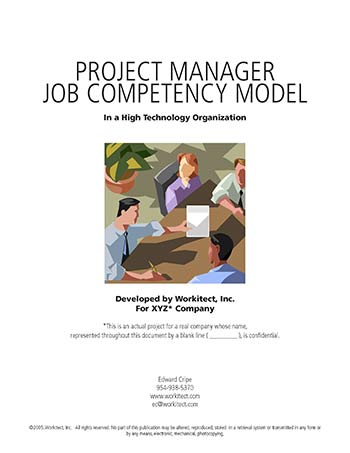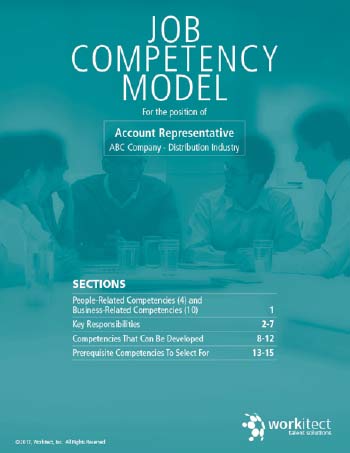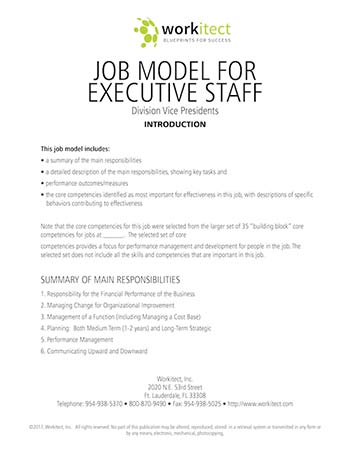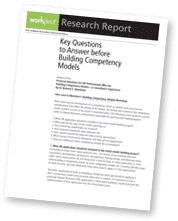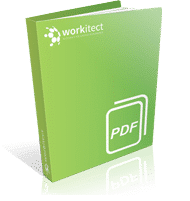BEST-IN-CLASS COMPETENCY MODELS
Developing competency frameworks and models that connect HR strategies with business strategies.
Competency Framework Consulting
Build a Strong Foundation and Framework for Talent Management
An integrated human resources or talent management system is a comprehensive set of human resource functions and programs that share a common architecture or “language” and are organized to complement and reinforce one another.
Models should reflect the unique reality of each organization.
Superior performance in one organization may look different in other organizations.
We help organizations develop competency frameworks, competency models, and HR applications that connect human resource strategies with business strategies. Each of our consultants has at least thirty-five years of experience in competency-based human resources, talent management, organization development, instructional design, and leadership development.
Review examples of our demonstrated capabilities
Learn More
Request Information Below
What are Job Competency Models?
A model is a group of related competencies that together describe superior or effective performance for a particular job or role, in a particular organization.
Workitect’s competency modeling process starts with superior performers being identified, and then studied, to determine the skills, knowledge and personal characteristics that they possess that enables them to be superior performers. The methods used to collect data for the study, such as behavioral event interviews and expert panels, are designed to get beneath mere opinions about superior performance and superior performers.
Competency Models developed by Workitect include these sections:
- Overview of the competencies (typically 8-12) that may include competencies required to support the company’s mission, values, and strategy.
- Major responsibilities and performance measures
- Definition and behavioral indicators of each competency
- Optional –
– Links between responsibilities and competencies
– Technical skills and knowledge requirements
– Future Scan – potential changes affecting the job in the future
– Recommendations on ensuring that incumbents demonstrate each competency, through selection, development, and/or training
Examples of Custom Competency Models
Here are examples of competency models developed by Workitect in a variety of formats:
Workitect’s 6-Step Competency Modeling Methodology
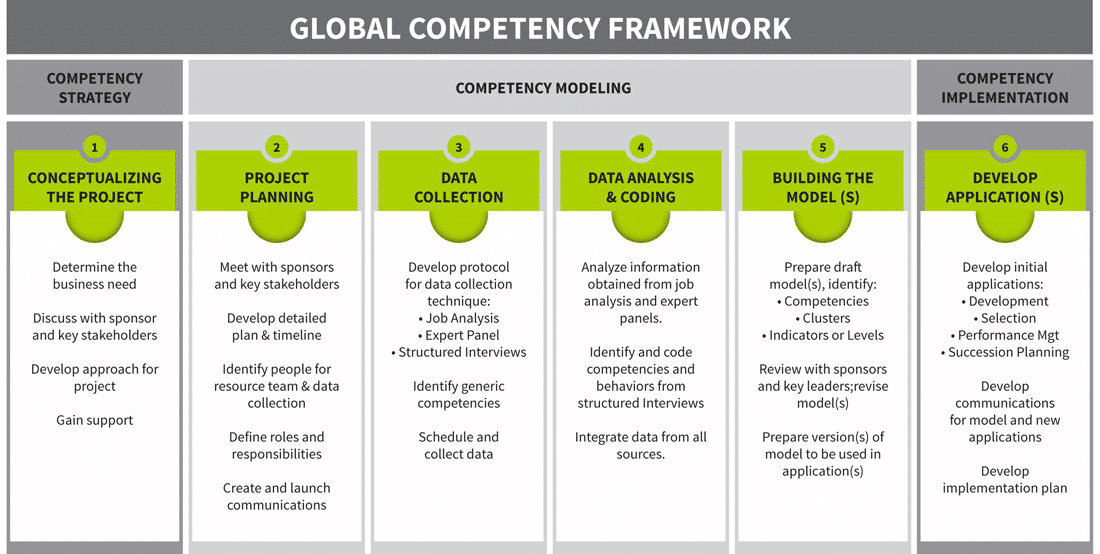
Competency Consulting Projects Completed
Our consultants have successfully completed projects for a variety of small, medium, and large-size global organizations, in the public and private sector, focusing on competency models and applications for leadership, management, professional, and technical positions.
View examples of completed projects
Competency Models Implementation Support
The manner in which you introduce and implement the concept of competencies within your organization will determine the effectiveness of your efforts. Installing competency models should be viewed as an organizational change initiative requiring deliberate actions to influence and get buy-in from the organization’s managers as well as incumbents in the positions impacted.
A Workitect consultant will work with you to develop an implementation strategy and plan based upon the needs of your organization. The plan would address areas such as:
- Creating the business case for competency models in organizations.
- Identifying the first position(s) for which competency models will be developed.
- Identifying stakeholders in the initial competency models and a plan for influencing each stakeholder.
- Establishing a communications plan to support the development of competencies for the initial positions selected and for implementing competencies within the organization.
- Determining the data gathering approaches to use for the first positions selected, including identifying who should be involved in each of the various activities.
- Ongoing coaching as you progress through the steps in developing your first job competency model.
Guided Launch of a Competency-Modeling Project
The Guided Launch program combines Workitect’s proven training in building competency models with our on-site implementation support for building an organization’s first model. It is a customized combination of training, consulting, and coaching from a Workitect senior consultant that can be provided on-site or remotely. It includes a tailored version of our Building Competency Models workshop and can include technical competencies by applying the processes taught in our Creating Technical Competencies workshop. It can be developed and conducted for organizations of any size. Learn more >
Alternative Methods
Competency-Modeling using Job Analysis interviews and Resource Panels
Many organizations are finding it difficult to launch a competency-modeling project, often due to a lack of time, staff, or budget. To help these organizations, we have taken material from our Competency Modeling workshop and developed a program to enable a competency dictionary licensee to build competency models using focus group resource panels (aka expert panels), supplemented with job task analysis interviews. Includes model templates for 12 jobs. Requires a Workitect Competency Dictionary license. More Details
Job Competency Profiling using Virtual Resource PaneIs
This is web-based survey process for collecting information about job requirements and potential competencies. The survey contains both open-ended comment questions and quantitative ratings for collecting information about what a job requires. A set of 6-20 jobholders, managers of jobholders and other persons who are familiar with the job complete the survey. Workitect administers the survey, analyzes the responses, and prepares a detailed report that includes a draft competency model. Requires a Workitect Competency Dictionary license.
Sample Report | More Details
Launching a Project: Conceptualizing the Approach
The first key step in a consulting project is to decide if and how a project should go forward. It is step 1 in our 6-step process as taught in our Building Competency Models workshop. It includes:
- Thinking through the need
- Clarifying the need through discussions with the sponsor and other key stakeholders
- Developing an approach
- Gaining the sponsor’s support for the approach

Applications
Competency-based HR applications have been created for performance management, assessment and selection, succession planning/management, training and development, and workforce management (re-engineering, upskilling, downsizing, and mergers).
Practical Questions To Answer before Building Competency Models
When planning the development of a competency framework, competency model or models, there are practical considerations that affect the design of the project, the format and content of the competency model, and the success of the project’s implementation. The following seven questions may be useful to professionals responsible for planning and implementing:
- What HR application should be included in the initial competency model building project?
- What will the key users of the job competency model need from it?
- How should key stakeholders be involved?
- How extensive should the data collection be?
- How should research be balanced with intuitive approaches?
- What format of behavioral descriptors will best suit the HR application?
- How can additional, future competency models be accommodated?

To speak with a consultant about your situation, needs, and our capability to help:
Call 800-870-9490
Complete this contact form
Send an email to ec@workitect.com
What Our Customers Say
“I’ve seen many overly complicated systems. This is a more simplified competency dictionary.”

